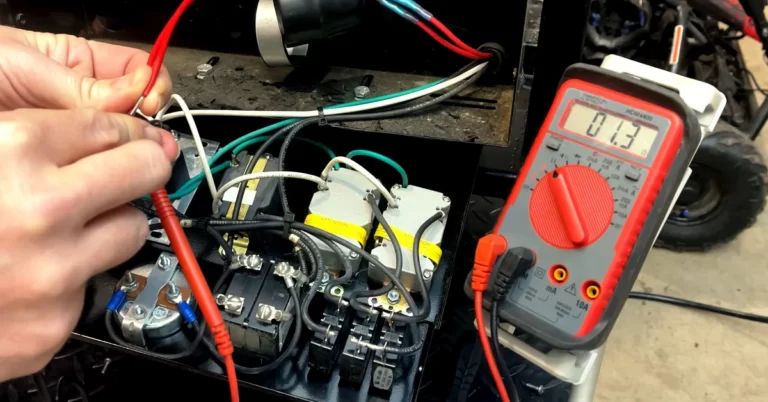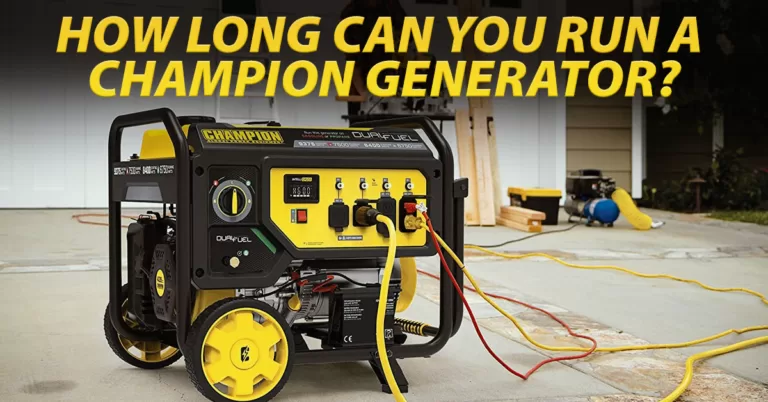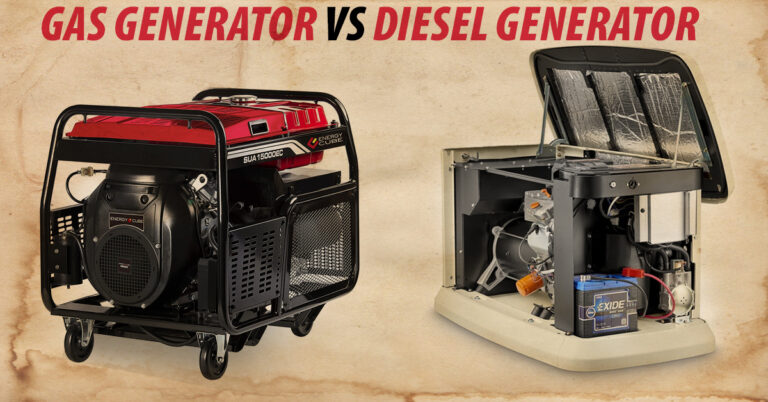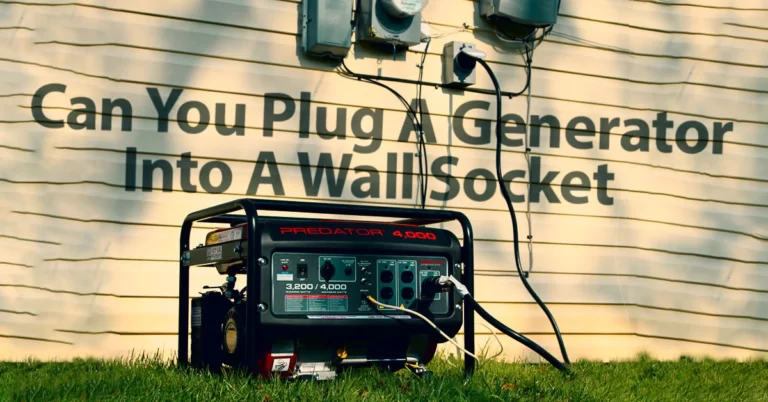What Will A 12000 Watt Generator Run?
Many people rely on 12,000-watt generators during emergencies or power outages. These generators provide sufficient electricity to assist homes and workplaces in such situations. Now, let’s delve into 12,000-watt generators and discover the intriguing question: “What will a 12000 watt generator run?”
Know Your Power: How Much Wattage You Need?
Wattage measures how much power your devices and appliances use. Add the wattages of all the devices you want to use in order to determine how much electricity you require. To convert to kilowatts, divide the sum by 1000. For example, if your fridge needs 1000 watts, you’ll need a 1 kW generator.
Starting Or Surge Watts
These watts are used to kick-start big appliances that need lots of power. They are always more than the watts needed to run the appliance regularly.
Running Or Rated Watts
The amount of power needed to keep appliances operating without interruption is known as running watts. They’re usually less than surge watts.
Example: 12,000-Watt Generator
A 12,000-watt generator can give you 12,000 surge watts. But it can steadily provide around 9,500 watts.
Things to Keep in Mind
Even though a 12,000-watt generator can run most of your whole house’s appliances, Understanding surge and rated watts helps you pick a generator that fits your power needs well.
Explore: What Will A 12000 Watt Generator Run?
A 12,000-watt generator can make 4-5 appliances work at the same time, whether you’re using it at a construction site or home. The exact number of appliances depends on how much power each appliance needs when it starts up and keeps running.
12,000-Watt Generator For Construction/Working Site
A 12,000-watt generator is handy for construction sites or when the power goes out. Just remember not to use more than 75% of its power to keep it safe. It can provide around 9,000 to 9,500 watts of power, enough for tools, lights, fans, heaters, fridges, and more. What it can run depends on your needs, but it’s good for medium-sized construction jobs like framing, concrete work, roofing, and landscaping while running many tools at once.
Example:
A 12,000-watt generator can simultaneously power various construction site appliances. Here’s an overview of common appliances and their approximate total power needs. Can the generator handle them all effectively?
- 1 Angle grinder: 1000 watts running, 1500 watts starting
- 1 Impact wrench: 1200 watts running, 1800 watts starting
- 1 Hammer drill: 1400 watts running, 2000 watts starting
- 1 Wet saw: 1500 watts running, 1800 watts starting
Adding up the total wattage for each appliance:
Total wattage: 5100 watts
So, when we use all these tools at once, they need 5100 watts in total. This is less than the capacity of a 12,000-watt generator, so that it can handle them all easily on the working site.
Can a 12,000-watt Generator Power Your Entire Whole House?
A 12,000-watt generator is suitable for home use, but consider your power needs and house size. Here are some rough ideas tables to help you decide.
| House Size | Generator Capacity (Watts) |
|---|---|
| 1,000 – 1,500 sq ft house | 6,000 – 8,500 watts |
| 1,500 – 2,000 sq ft house | 8,500 – 10,000 watts |
| 2,000 – 2,500 sq ft house | 10,000 – 14,000 watts |
| 2,500 – 3,000+ sq ft house | 18,000 watts or larger |
If you use a lot of devices, a 12,000-watt generator might not be able to supply every watt of power your whole house requires. But it can work well for important things like microwaves, TVs, fridges, and such in a medium-sized home.
Example:
A 12,000-watt generator can power many things in your entire house. Let’s look at the appliances and how much approximate power they need:
- 1 Refrigerator: 700 watts running, 2200 watts starting
- 1 Freezer: 500 watts running, 1500 watts starting
- 1 Dishwasher: 1500 watts running, 1500 watts starting
- 1 Clothes dryer: 5400 watts running, 6750 watts starting
- 1 Microwave oven: 1000 watts running
Adding up the total wattage for each appliance:
Total wattage: 8600 watts
When all these things run at the same time, they need 8600 watts of power. That’s less than what a 12,000-watt generator can handle. So, you can use these appliances in your whole house without causing problems for the generator.
What Appliance Can Be Run With a 12000 Watt Generator?
A 12,000-watt generator can work with big appliances and many devices at once. Here’s a table providing a rough idea of the power requirements for various appliances when starting and running.
| Appliance | Running Watts | Starting Watts |
|---|---|---|
| Air Compressor 1 HP | 1600 | 4500 |
| Ceiling Fan | 60-70 | 0 |
| Cell Phone Battery Charger | 25 | 0 |
| Central AC (24,000 BTU) | 3800 | 11400 |
| Circular Saw 7 1/4 inch | 1400 | 2300 |
| Clothes Dryer (Electric) | 5400 | 6750 |
| Coffee Maker | 1000 | 0 |
| Common Light Bulb | 75 | 0 |
| Copy Machine | 1600 | 0 |
| Deep Freezer | 500 | 1500 |
| Dishwasher | 1500 | 1500 |
| Electric Drill 1/2 inch 5.4 Amps | 600 | 900 |
| Electric Kettle | 1200 | 3000 |
| Electric Mower | 1500 | 0 |
| Furnace Fan Blower (1/2 HP) | 800 | 2350 |
| Garage Door Opener (1/2 HP) | 875 | 2350 |
| Halogen Work Light 1 kW | 1000 | 0 |
| Heat Pump | 4700 | 4500 |
| Home Internet Router | 5 | 15 |
| Microwave | 1000 | 0 |
| Planer/Jointer 6 inch | 1800 | 2500 |
| Projector | 220 | 270 |
| Refrigerator / Freezer | 700 | 2200 |
| Security System | 500 | 0 |
| Sump Pump (1/3 HP) | 800 | 1300 |
| Toaster | 850 | 0 |
| Treadmill | 280 | 900 |
| Window AC (10,000 BTU) | 1200 | 3600 |
Can a 12,000-Watt Generator Effectively Power a Heat Pump?
A 12,000-watt generator can make a 3-ton heat pump work well, and even a 4-ton if it’s the only thing it’s powering. Normally, heat pumps need 500 to 8,000 watts, which is okay for a 12,000-watt generator. But when they start, they need 2-3 times more power. So, when you pick a generator, make sure it can give enough power for the heat pump to start properly. If you want it to work even better, think about getting a 17,000-watt home standby generator.
Can a 12,000-Watt Generator Power an Air Conditioner?
A 12,000-watt generator works well for a 3-ton air conditioner and can handle a 4-ton AC if it’s the only thing it’s powering. However, you must make sure the generator can supply the necessary amount of electricity for the AC.
Please pay attention to the AC’s starting or surge wattage, which can be much higher than its regular running power. If the AC’s starting power is too high for the generator, it can overload and stop working.
Here’s an idea of how long different AC sizes can run when the generator is at half power:
- 2 Ton: About 4 to 6 hours.
- 3 Ton: About 3 to 4 hours.
- 4 Ton: About 2 to 3 hours (but it’s not the best idea).
- Central Air: About 1 to 3 hours (also not the best idea).
These estimates are based on a generator with a 7-8-gallon tank that uses 2-2.5 gallons of fuel per hour. The ideal generator will rely on the make, model, and energy efficiency of the AC.
Can a 12,000-watt Watt Generator Power a 2-Ton AC Unit?
Yes, a 12,000-watt generator can effectively run a 2-ton AC unit, which typically requires a starting wattage of 3,500 watts and a running wattage of 1,750 watts.
Can a 12,000-Watt Generator Power a 3-Ton AC Unit?
A 12,000-watt generator is good for a 3-ton AC. The AC starts with roughly 3,500 watts and runs on 1,500 watts. But when you use the AC, it uses most of the generator’s power, about 80-85%. While a 12,000-watt generator allows you to run the AC alongside other devices, it’s advisable not to exceed 80% usage to ensure the generator’s longevity and prevent overheating.
Can a 12,000-Watt Generator Power a 4-Ton AC Unit?
Using a 12,000-watt generator to power a 4-ton AC is possible but not a great idea. The AC needs a lot of power to start (10,000 to 14,000 watts) and to keep running (3,900 to 4,500 watts). While the generator can make the AC start and work, it might struggle at the beginning and could even damage the generator’s circuit breaker.
After the AC is running, the generator can keep going for 2 to 3 hours, but it’s better not to use other devices at the same time to avoid overloading the generator. The ideal generator will rely on the make, model, and energy efficiency of the AC.
Usually, bigger AC units (2.5 tons or more) may need a stronger generator, while smaller ones (2 tons or less) should be fine if you don’t use other devices together.
Will a 12,000 Watt Generator Run Central AC Units?
You can use a 12,000-watt generator to run a central AC, which typically needs between 2,000 to 3,500 watts. But it’s not the ideal option, especially if you’re utilizing other powerful appliances.. Central AC units require a lot of power to start, and a 12,000-watt generator might struggle. If you have an older, less efficient AC, you may need a larger generator, like one with 15,000 to 18,000 watts, to ensure reliable operation. The suitable generator size depends on your AC unit’s specific model and efficiency.
How long can a 12,000-watt generator run before it runs out of power?
A typical 12,000-watt generator can provide around 10 hours of power, but this varies based on usage, fuel capacity, and efficiency. Different generator brands and types have varying runtimes, with fuel tank size playing a role.
Most 12,000-watt portable generators come with fuel tanks holding 7 to 8.5 gallons. Larger tanks equal longer runtime. Trusted brands like DuroMax, Champion, or WEN can last 8 to 10 hours on one tank at 25% to 40% power usage. However, running at higher loads, like 60% or 100%, depletes fuel much faster.
How Good Is a 12000-Watt Generator?
A 12,000-watt generator is really good. It can power your house and heavy tools, making it handy during hurricane season and long power outages. So, it’s a great choice for big homes, businesses, and tough jobs.
Choosing The Right 12,000-Watt Generator:
When selecting a 12,000-watt generator, consider the following factors to ensure you make the best choice for your specific needs:
- Your power requirements: Determine the minimum generator size you require by making a list of all the appliances and equipment you must power at once, figuring out their wattage requirements, and then adding 20%.
- Fuel options: Choose between gasoline, propane, or diesel generators, considering factors like fuel efficiency, cost, and emissions based on your preferences and fuel availability.
- Noise level: Assess noise-reducing features and the generator’s decibel rating to find one suitable for residential or public event use.
- Portability: Decide whether you need a generator that’s easy to move around or will be in a fixed location, considering factors like wheeled frames and handles.
- Safety features and certifications: Look for safety features in generators, including low-oil shutdown and overload protection, and look for certificates from reputable companies.
- Price and warranty: Set a budget, research options within your price range, and prioritize generators with good warranties to ensure peace of mind.
Consider factors, understand power needs, make an informed 12,000-watt generator choice, prioritize safety, and follow manufacturer guidelines.
How to Keep Your 12,000-Watt Generator in Good Shape?
Taking care of your 12,000-watt generator is crucial to make sure it works well for a long time. Here’s what you should do:
Regular Maintenance:
Read the Manual
Look at the instructions from the manufacturer in the owner’s manual.
Change the Oil
Make sure to perform routine oil changes. First time after 20-30 hours, and then every 50-100 hours.
Check the Air Filters
Keep the engine clean by checking and changing the air filters when needed.
Inspect Spark Plugs
From time to time, please take a look at the spark plugs and change them to keep the engine working well.

Clean the Fuel System
Keep the fuel tank, lines, and carburetor clean to avoid problems. Also, use fuel stabilizers to keep the fuel fresh.
Proper Fuel Storage and Safety:
Use the Right Containers
Store fuel in containers meant for it and follow the rules in your area.
Keep Fuel Fresh
Use fuel stabilizers and switch out your fuel supply to stop it from going bad.
Store Fuel Safely
Put fuel containers away from where people live, heat, and sunlight, and make sure there’s good airflow.
Fixing Common Problems:
Generator Won’t Start:
- Check if there’s enough fuel and oil.
- See if the spark plugs are okay.
- Look at the choke settings.
- Check the battery (if your generator has one).
Despite Running The Generator, There is No Power
See if the circuit breakers and fuses are working right, and check the wiring and grounding for any problems.
Unstable Generator Output
If the generator isn’t working right, so test the generator to find out what’s wrong by looking at things like overloading, a dirty carburetor, or a broken voltage regulator.
By doing these things, you can make sure your 12,000-watt generator lasts a long time and keeps working well.
FAQs
-
How Loud Is a 12000-Watt Generator?
A 12000-watt generator is typically around 78 decibels (dBA) loud at a distance of 23 feet.
-
Is A 12000-Watt Generator Safe?
A 12,000-watt generator can be safe, but it is important to use it properly and follow all safety precautions.
-
What Is The Price Of A 12,000 Watt Generator?
A 12,000-watt generator’s cost varies according to features, brand, model, and fuel type. The typical price range for these generators is between $1,000 and $3,500.
-
Which Breaker Size Is Required for a 12kW Generator?
If you have a 12KW generator, it’s best to use a 60-amp breaker. This keeps things safe because it can draw up to 100 amps at full power so that you won’t overload it.
End Words
Understanding your power needs and prioritizing safety when selecting a 12,000-watt generator are essential steps. Proper maintenance and considering factors like fuel options, noise levels, and portability ensure reliable power during emergencies or demanding tasks. So, what will a 12,000-watt generator run? With its substantial capacity, it can efficiently power various appliances, making it a versatile choice for both residential and construction applications.







